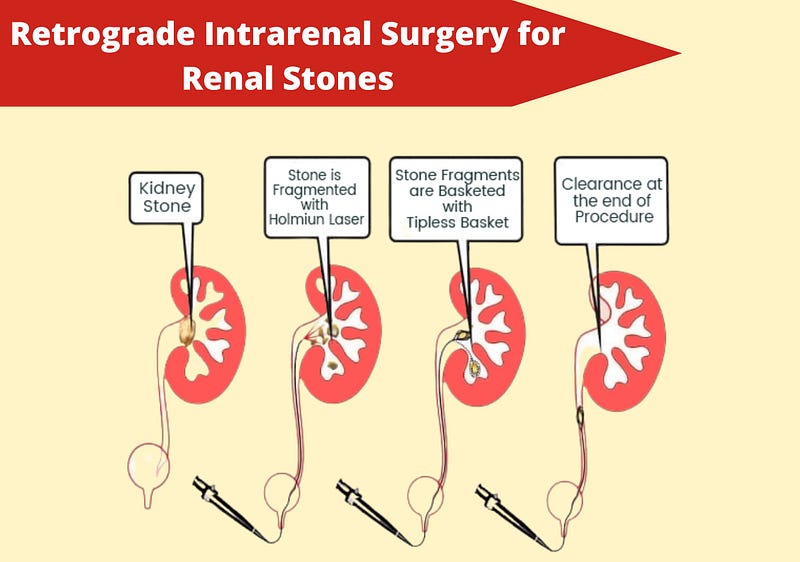RIRS, or Retrograde Intrarenal Surgery, is a minimally invasive procedure used to treat kidney stones located within the kidney and upper urinary tract. It is typically performed by a urologist who specializes in endourology, using a flexible ureteroscope and other specialized instruments.

Here’s how RIRS surgery is generally performed:
1. Preoperative Preparation:
Before the surgery, the patient may undergo imaging tests such as a CT scan or an ultrasound to precisely locate the kidney stones and assess their size and number. This helps the urologist plan the procedure effectively.
2. Anesthesia:
RIRS is usually performed under general anesthesia, although in some cases, local anesthesia with sedation may be used. The choice depends on the patient’s overall health and the preferences of the surgical team.
3. Insertion of the Ureteroscope:
The procedure begins with the insertion of a thin, flexible ureteroscope through the urethra and into the bladder. From there, the urologist navigates the scope up through the ureter and into the kidney. The ureteroscope is equipped with a small camera and a light source to visualize the stones and the internal structures of the kidney.
4. Laser Lithotripsy:
Once the stones are visualized, a laser fiber is passed through the working channel of the ureteroscope. The laser delivers short pulses of energy that break the kidney stones into smaller fragments. The urologist carefully targets and fragments each stone until they are small enough to be easily removed or passed naturally through urine.
5. Stone Removal:
After fragmentation, the urologist may use small baskets or graspers passed through the ureteroscope to retrieve the stone fragments. In some cases, a suction device may also be used to remove the smaller stone pieces.
6. Postoperative Care:
Once all visible stones have been removed or adequately fragmented, the ureteroscope is withdrawn, and a temporary ureteral stent may be placed to ensure urine flow and prevent swelling or obstruction. This stent is typically removed in a follow-up visit after a few days to weeks, depending on the urologist’s recommendations.
7. Recovery:
Recovery time after RIRS is relatively short compared to traditional open surgery. Most patients can expect to go home the same day or after an overnight stay in the hospital. Mild discomfort, urinary urgency, or blood in the urine may be experienced temporarily, but these symptoms typically resolve within a few days.
Benefits of RIRS:
- Minimally invasive with smaller incisions or no external incisions at all.
- Reduced risk of complications such as bleeding and infection compared to open surgery.
- Faster recovery time and shorter hospital stay.
- Effective for treating a variety of kidney stone types and sizes.
Considerations:
While RIRS is highly effective for most kidney stones, not all patients are suitable candidates. Factors such as stone size, location, and the patient’s overall health are considered before recommending RIRS. Your urologist will discuss the best treatment options based on your specific condition and preferences.
In conclusion, RIRS is a sophisticated and effective procedure for managing kidney stones, offering patients a minimally invasive option with excellent outcomes and quicker recovery times compared to traditional surgical approaches.
Comments
Post a Comment